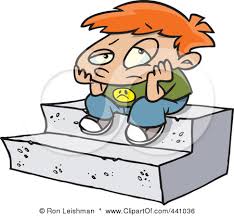by Sandra Dodd, 1998

Another homeschooling mom once wrote, "It's a valuable lesson to learn to deal with boredom, just like all other emotions."
Until I read that, I hadn’t ever thought of boredom as an emotion. I liked the idea. When a child comes to me seeking advice on how to deal with any emotional state, I'm flattered and glad for the opportunity.
Traditionally in this culture boredom is seen as a state of sin. "I’m bored" is met by unthinking parents with, "Then mop the kitchen," or "You have a thousand dollars’ worth of toys, you can’t be bored," or "Boredom’s good for you." I believe the VERY common habit of belittling children who use the word "bored" should be rethought (or "thought," since it seems many parents have never considered it carefully but just repeat what their parents said to them).
If a child came and said she was heartbroken would you tell her she was a brat and should clean the garage? If a child came and said he was angry enough to hit would you say, "Then sit down and read a book whether you want to or not"? Wouldn’t you try to help them? It's nonsensical to me that some parents shame their children for saying they are at a loss about what to do next.
The most to be accomplished from punishing or sending bored kids away is that the kids will learn not to go to that parent for advice and ideas.
Sometimes the real message behind "I'm bored" is "I'm little and feeling agitated and vaguely unhappy and I don't know what I can do to get over this uncomfortable feeling. What would you do if you were my age, in this house, on a day like this?"
I think that deserves a helpful, respectful response.

It is rare that my children say "I’m bored," but when they do I walk with them where they are, or to some other part of the house, thinking quickly about what I might have that they have never seen, or haven’t seen for a while. I think of art supplies or games or toys or musical instruments they haven’t thought of for a long time. I scan my mind and the house for things which would provide some visual, auditory, olfactory, or mental stimulation, preferably two or three of those. Tactile stimulation is good too—perhaps the offer of a shower or bath with new/different toys, or different soap or something. Sometimes "watering the yard" (playing with the hose) will do. When a baby cries for no clear reason, parents will often joyfully see whether the baby means "I’m uncomfortable." They’ll try a change of clothes, physical contact, a change of temperature, more air, less air, hot food, cold food, a stroll outside, a car ride, SOMETHING different. Older kids have the same needs, and the expression of that need might come through as whining, irritability, or a claim of boredom.
Maybe it’s not physical need, but intellectual need. Boredom is a desire for input which unschooling parents should welcome. It’s a child saying "How can I add excitement to my life?" This can be a big opportunity to introduce a new subject, activity, or thought-collection.
Maybe it’s an emotional need, and the parent’s undivided attention for a little while will solve the problem. A walk, some joking, a hug, inquiries about progress on the child’s projects or plans or friends might serve many purposes at once. If after a walk and a talk the child is not quite refreshed, you still had that time together, which made "I’m bored" a useful invitation to bonding.
Sometimes "bored" means tired, low on energy, needing a break from conscious thought and responsibility. Arranging a nap, or putting on a soothing video (even for older kids—a romance instead of an action flick, or light drama instead of comedy), leaving a pillow on the couch and herding the rest of the family in other directions might result in an unplanned but needed nap.
I’m grown. I still get bored occasionally. Thinking about why I’m bored and forgiving myself for being bored have helped me assist my children in learning some coping skills they can use in their own lives. I have also used my occasional boredom as a trigger to seek out the kids. If there’s a lull in my life now I should fill it with those children who will be gone too soon.
Welcome opportunities to learn about when and why your child asks for your advice and stimulation. The threshold of needing the parent will change over time, and parents can really use knowing where it is and seeing the benefit in it. One complaint of parents of school kids is that communications are lacking or are misunderstood. Homeschoolers have the fulltime luxury of the chance to do better. Unschoolers have the added advantage of "counting" every interaction as a learning experience. Self awareness, interpersonal skills, creativity and compassion all come into play when a child and a parent can build an uplifting memory from "I’m bored."
"Bored No More" was published in
Home Education Magazine in September 1998
in Home Education News in British Columbia in January/February 2003
and in Acorns Volume 7, Issue 7, March 2004
No comments:
Post a Comment